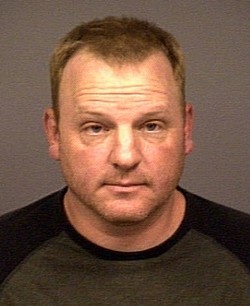A vortex for trouble
How the Central Coast became the center of a specialized type of lender fraud
By Patrick Howe[{
"name": "Ad - Medium Rectangle CC01 - 300x250",
"id": "AdMediumRectangleCC01300x250",
"class": "inlineCenter",
"insertPoint": "8",
"component": "2963441",
"requiredCountToDisplay": "12"
},{
"name": "Ad - Medium Rectangle LC01 - 300x250",
"id": "AdMediumRectangleCC01300x250",
"class": "inlineCenter",
"insertPoint": "18",
"component": "2963441",
"requiredCountToDisplay": "22"
},{
"name": "Ad - Medium Rectangle LC09 - 300x250",
"id": "AdMediumRectangleLC09300x250",
"class": "inlineCenter",
"insertPoint": "28",
"component": "3252660",
"requiredCountToDisplay": "32"
}]
If it seems as though an unusually large number of local construction lenders have fallen into trouble lately, they have.
The recent arrests of the mother-and-son leaders of the bankrupt Paso Robles-based Estate Financial firm were met with cheers from many of the hundreds of local investors who have been battling for months to get some of their collective millions back.
Yet the Estate Financial news was only the latest in a series of grim headlines alleging wrongdoing in a highly specialized and little-known area of finance known as hard-money lending.
One state expert said the Central Coast, at least lately, has been the center of trouble in this one risky category of lending.
Tom Poole of the California Department of Real Estate, has spent 24 years in the department, first as an investigator and now as the agency’s spokesman.
“It does seem to be, for the moment anyway, concentrated in your area,” Poole said.
Among the local lenders who have fallen:
Atascadero’s Hurst Financial, which had at least $86 million in investments last year, was accused of fraud in September in filings by the Department of Real Estate, months after its license was revoked by the Department of Corporations.
Real Property Lenders of Paso Robles, with about $55 million in loans as of 2007, had its license revoked by the Department of Corporations in May.
21st Century Mortgage, also of Paso Robles, closed down suddenly a year ago, leaving many investors scrambling to figure out what had become of their investments. Other firms eventually bought most of the loans.
Still, none of those firms have yet attracted the sort of attention as Estate Financial, whose $170-million in loans were frozen and put under court control over the summer, shortly after the state revoked its license to sell real estate investments, alleging various fraudulent schemes.
Estate Financial’s President, Karen Guth, and her son Joshua Yaguda were arrested at their Paso Robles Ranch on Oct. 16 by investigators for the SLO County District Attorney’s Office. They were joined by investigators from the FBI, the Internal Revenue Service, and state Departments of Real Estate and Corporations. Guth and Yaguda faced bail on the arrest warrants of $5 million.
In the simplest terms, hard-money lenders give loans without worrying about a borrower’s credit, because there’s something tangible backing their loans, usually a construction project and land.
Although the loans were comparatively expensive—typically more than 13 percent annually—they were attractive in part because they generally didn’t require builders to put any money down.
For investors, the loans were considered high-risk, high-reward investments. But there were supposed to be certain protections and investigators have found that, in many cases, those protections were overridden or never followed.
“I’m guessing you’re in an area with a lot of wealthy retirees,” Poole said. Hard money loans were attractive to retired investors because they promised high returns of about 12 percent per year, and they were paid in monthly installments.
Ron Berry, co-owner of the Paso Robles-based Phoenix Recovery Group, which has taken over many of the abandoned projects and helped to organize investors, said many retirees fell prey to “predatory” brokers.
“They were the perfect clients because they wouldn’t, or often couldn’t, go out and check the projects. The checks and balances were very minimal.”
Guy Puccio, a former advisory commissioner with the Department of Real Estate and an expert on hard-money lending, said the Central Coast may simply be ahead of the curve. He said he expects many more problems to surface statewide over the next 18 months.
Puccio and others said problems in the industry have come in waves, with the late 1970s and ’80s also producing shakeouts.
The latest round of problems, he said, came about as hard-money lenders turned to increasingly more complex investments. Those investments were not always adequately understood by regulators and it took the housing downturn to reveal the problems.
“When the market goes down,” Puccio said, “problems bubble up.”
Builder Brad Cross invested hundreds of thousands of dollars in Real Property Lenders and Estate Financial and is fighting in the courts to get at least some of it back.
Beyond the number of retirees, Cross said there was also a lot of growth going on in the North County region that needed financing.
Then, he said, when certain brokers started to cut regulatory corners, competition may have driven others to follow.
“It was kind of a slippery slope here,” he said, “All of these brokers all knew each other and they were all competing for the same borrowers. One would cut corners and others would follow.”
Managing Editor Patrick Howe can be reached at [email protected]
Latest in News
Readers also liked…
-

Coast Unified teachers upset over new position's salary and qualifications
Oct 20, 2022 -

SLO police identify alleged driver who hit and killed couple
Dec 22, 2022 -

When the levee breaks: Oceano residents, county officials walk a tightrope of regulations to manage Arroyo Grande Creek, which some say led to the levee's failure in January
May 18, 2023










